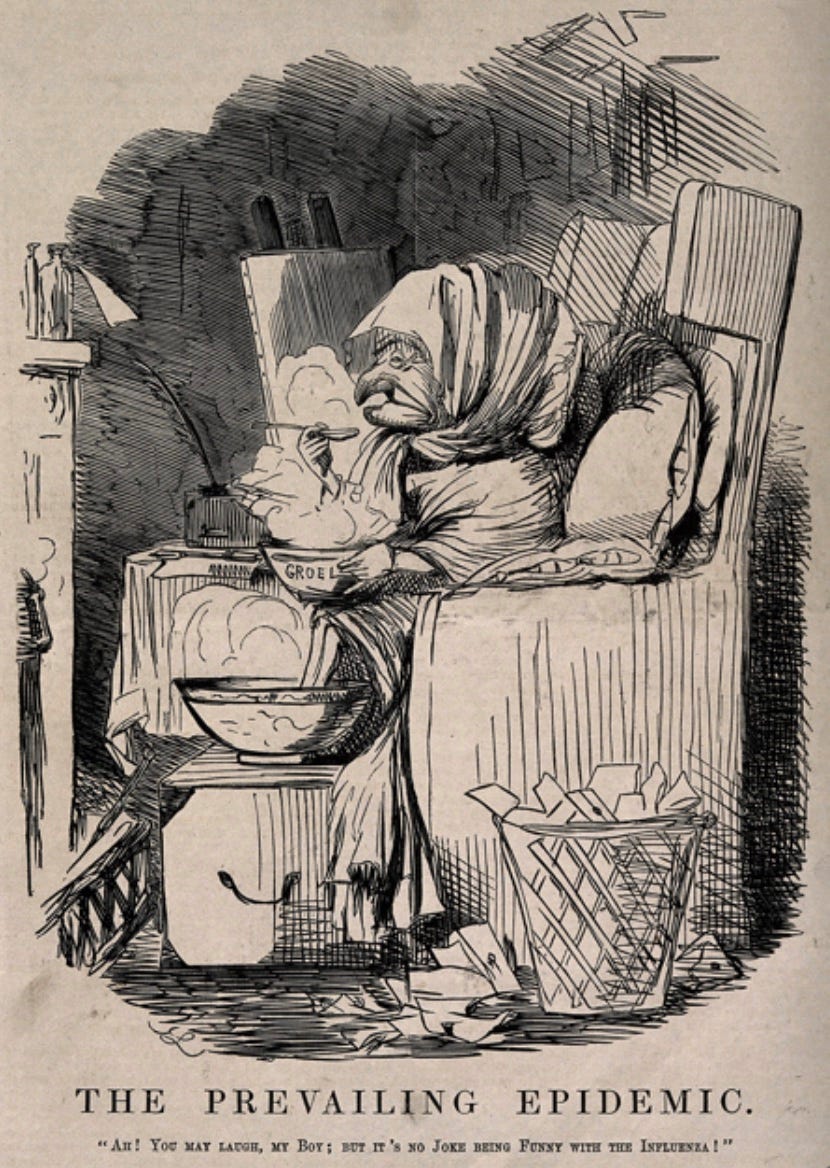The pandemic comes home
After three years and five vaccines, I have finally succumbed to Covid. But how to describe "this body, this miracle, its pain"?
In 1824, the English essayist and poet Charles Lamb complained to his friend, Bernard Barton, that he had been struck by a “whoresome lethargy” so incapacitating he barely had the will to put pen to paper.
Do you know what it is to succumb under an insurmountable daymare… an indisposition to do anything, or to be anything, a total deadness and distaste; a suspension of vitality? My fingers drag heavily over this paper, and to my thinking, it is three and twenty furlongs from here to the end of this demisheet… I have not volition enough left to dot my i's, much less to comb my eye-brows.
I know how he feels. After three years, five vaccines and several false alarms, I have finally tested positive for Covid and, as during lockdown, my world has once again shrunk to the perimeters of my home.
It is a comfortable, middle-class home but one in which every sound, from the ping of my wife’s phone to the idle chatter of kids passing by the bedroom window, is amplified.
I would like to think my symptoms are unusual and evidence of what Virginia Woolf, reflecting on her own bouts of illness during an earlier pandemic era, referred to as “a mix up of influenza with my own remarkable nervous system”.[1]
On the other hand, even when well, I find stray sounds annoying, and, as my wife can attest, am especially grumpy when ill. None of which makes it easier to accept the unwanted auditory intrusions or convey the subjective experience of my illness.
In her essay, On Being Ill, Woolf doubts that prose is capable of conveying “this monster, this body, this miracle, its pain”, at least not without slipping into mysticism.[2]
“I am in bed with influenza” - but what does that convey of the great experience; how the world has changed its shape… the whole landscape of life lies remote and fair, like the shore seen from a ship far out at sea.[3]
One of the most notable features of Woolf’s essay is how it challenges us to engage with her illness experience outside of preconceived medical and diagnostic categories. Like John Donne’s Devotions Upon Emergent Occasions, Woolf’s musings on pain and suffering seem to speak directly to readers in the present, demolishing the barriers that time and changing theories of body and mind erect between convalescents in different eras.
Instead, invoking the image of a delirious invalid lying in bed listening for the creak of her lovers’ footstep on the stairs, she writes that it would be an error to assume that a novel devoted to influenza “lacked plot” or that “there was no love in it”. This is because “illness often takes on the disguise of love and plays the same old tricks”.
It suck’d me first
I would like to think my grumpiness is also an expression of love. I too listen out for the telltale creak of my wife’s footsteps even as I curse the pings from her phone. And though I lie prone in bed, trying to ignore the sciatica from an old back injury and the feeling of being wrapped in cotton wool, stray lines of poetry, subtly altered, pop into my head. Not the obvious ones, about “no man being an island”, but the more suggestive ones.
It suck’d me first, and now sucks thee/And in this flea our two coronas mingled be... This flea is you and I, and this/Our marriage bed, and Covid temple is”.
Delirious, I soon find my mind going where my libido cannot, “before, behind, between, above, below”. I am nothing but “two fooles, I know/For loving, and saying so/In whining poetry”.
But I am soon done with Donne. As Woolf reminds us, an illness this profound, this encompassing, “sweeps all that aside and leaves nothing but Shakespeare and oneself.”[4]
I consult my mental Rolodex, searching for half-remembered quotes from the bard. Perhaps, like Cleopatra, Covid is the ultimate chameleon. “Age cannot wither her, nor custom stale/Her infinite variety”. And while lesser viruses “cloy the appetites they feed… she makes hungry/Where most she satisfies”.
Is that what Lamb meant by a “whorseome lethargy”? Has Covid taken on the “disguise of love” or have I taken leave of my senses?
Alas, dear reader, my fingers begin to drag. No doubt Corona has many more tricks to play but, right now, my eyebrows are desperately in need of a trim.
[1] Nigel Nicholson (ed) The Letters of Virginia Woolf, II. London: Hogarth Press, 1975. 23 September 1922, p. 559.
[2] Virginia Woolf, ‘On Being Ill’, in The Moment and Other Essays.
[3] Woolf, ‘On Being Ill’, p. 16.
[4] Ibid, pp. 21-22.





Hi Philipp - only just seen this comment for which thanks. It's no fun being ill but I find that poetry is the best antidote for the lassitude that comes with the virus.
Hilerious train-of-thought, I quite enjoyed following through, as I wish to proclaim a swift and mundane recovery from the claws of illness that brought it fourth. Get your rest and see you up in no time Mark!